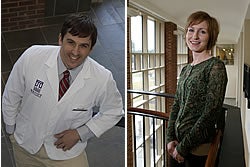Two ECU medical students receive fellowships to work in Africa
Two third-year medical students from East Carolina University will spend three months working in the Gabon, Africa, hospital that humanitarian and physician Albert Schweitzer established.
Marie Rowe and Nicolaus Glomb have been selected as Albert Schweitzer Lambaréné Fellowship recipients for 2008. They are the second and third ECU medical students to be selected. Four other medical students nationwide have also been chosen for this year’s fellowship. ECU is the only school with more than one fellow.

Glomb, Rowe
Rowe, 28, grew up in Morehead City. She earned her bachelor’s degree from ECU, then worked as a chemist for a year at Metrics, a local pharmaceutical firm, before entering medical school. The fellowship has been a goal for her ever since Benjamin Gilmer, a former ECU medical student, was a fellow in 2004.
“I thought it was the greatest thing,” Rowe said. “Ever since, I’ve had my eye on applying for it, and it’s a dream to be able to go.”
Glomb, 34, grew up in Connecticut and has a bachelor’s degree from Villanova University in Pennsylvania. He is working on his master’s of public health degree at the University of North Carolina at Chapel Hill while attending medical school at ECU.
He worked in the Peace Corps from 1996-1998, serving in the West African country of Mauritania. Like Rowe, he also was inspired by Gilmer to seek a Lambaréné Fellowship and will work as a public health fellow, focusing on water sanitation and other means to prevent diseases such as malaria.
“For me, it’s even more appealing to go out in the villages instead of staying at the hospital,” Glomb said.
The Albert Schweitzer Fellowship selects four third-year medical students to spend three months working at the Albert Schweitzer Hospital in Lambaréné, Gabon. Most fellows work as junior physicians, supervised by hospital medical staff and are eligible for rotations in pediatrics, medicine and surgery.
At the hospital, patients are expected to supply their own linens, and family members help care for them. A lack of many modern diagnostic tools common in the United States puts a premium on traditional medical skills and intuition. Rowe is looking forward to testing her clinical skills in the relatively austere environment.
“I think it’ll make me a better doctor,” she said.
The hospital, on the banks of the Ogooué River in a tropical rain forest, has served as the primary health care source for the surrounding region since Schweitzer founded it in 1913. Today, an international staff of Gabonese and expatriate professionals provide care through more than 35,000 outpatient visits and more than 6,000 hospitalizations annually for patients from all over Gabon, an independent republic with a population of approximately 1.3 million.
The U.S. National Institutes of Health recognized the hospital’s research laboratory as one of five leading facilities in Africa engaged in scientific studies of malaria, the greatest killer on the African continent with more than 1 million deaths yearly. According to the fellowship Web site, children with severe malaria at the Schweitzer Hospital have the lowest documented mortality rate on the continent.
Rowe will leave in late July for Gabon, where she will live and work from Aug. 1 until Oct. 31. Glomb will leave in mid-December and serve until March.
Because Gabon is a French-speaking country, Lambaréné Fellows must be orally competent in French. That’s not a problem for Rowe. She was a high school exchange student who spent a year in France. Mauritania, where Glomb volunteered with the Peace Corps, is also a French-speaking country.
The Albert Schweitzer Fellowship funds airfare, room, board and immunizations.